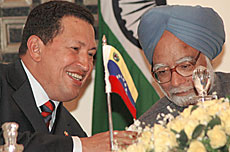NEW DELHI, 6 March 2005 — India and Venezuela signed a historic agreement yesterday, allowing Indian companies to take 49 percent stake in Venezuelan oil industry.
Under the agreement, one of the six signed, Oil and Natural Gas Corporation and GAIL Ltd., India’s largest energy companies, will be allowed to bid for exploration and production rights in Venezuela.
Describing the agreement as a “huge advance,” Petroleum Minister Mani Shankar Aiyar said: “For us to receive 49 percent plus the operation right is ... a huge advance and with that I am now truly well positioned to commercialize exploration work.”
While Venezuela is the world’s fifth biggest oil exporter, India imports 70 percent of its crude oil needs.
India and Venezuela are entertaining high-level contacts for the first time in over three decades.
Hugo Chavez is the first Venezuelan president to visit India. The last high-level visit to Venezuela from India was in 1968 by the then Prime Minister Indira Gandhi.
Prime Minister Manmohan Singh and Chavez also held wide-ranging talks, following which a joint statement was issued.
Venezuela has expressed support to India’s candidature for permanent membership of the UN Security Council, the statement said.
The six agreements signed by the two nations, paving the way for cooperation in various fields, including hydrocarbon sector, biotechnology, space science and technology and establishment of a joint commission, herald a new dimension in their bilateral ties, the statement said.
Besides, one memorandum of understanding was signed between ONGC Videsh Ltd. and the Venezuelan state petroleum company, PVDSA and another between Ircon and the Venezuelan railway authority, IAFE.
“They underlined the need for revitalization of Non-Aligned Movement so that it emerges as a major pole in a multipolar world, by becoming a collective, pragmatic and serious voice of the south,” the statement said.
While addressing reporters yesterday, Chavez said that Venezuela is keen to share its “oil potential” with India and over the past year has struck oil deals with various countries, including China.
Eager to lessen its dependence on US, Venezuela is interested in new markets for its crude and more investors in its energy industry.
Chavez Says Washington Plots His Murder, US Denies
Chavez said yesterday he had evidence that the United States was planning to assassinate him, an accusation that a US official quickly denied.
“We have enough evidence. ... If anything happens to me, the person responsible will be the president of the United States,” Chavez told reporters in New Delhi. He did not offer any evidence.
In comments published yesterday by local media in Caracas, the US ambassador to Venezuela, William Brownfield said his country had “no plans or thoughts of assassinating either the president here or any other leader.”
“That would be a violation of our federal law,” added Brownfield.
The exchange of accusations between the left-wing Chavez and US officials has reached fever pitch in recent weeks, raising questions whether the multibillion-dollar energy relationship between Washington and one of its top oil suppliers is at risk.
On Friday in New Delhi, Chavez said his country would not stop supplying oil to the United States unless “the US government gets a little bit crazy and tries to hurt us.”
US Ambassador Brownfield said geographical proximity made the United States and Venezuela “natural” trade partners but added: “If the United States doesn’t buy oil from Venezuela, we’ll buy oil from another country, and if Venezuela doesn’t sell oil to the US, it’ll sell oil to another country.”
Venezuela’s Foreign Minister Ali Rodriguez told the Organization of American States last month that US accusations against Chavez were a sign of an impending attack. Washington dismissed what it termed these “wild charges.”
US Ambassador Brownfield said: “In the almost 200 years of mutual existence of our two countries ... the United States has never invaded, is not invading at this moment and will never invade Venezuela. Full stop.”
Brownfield, whose repeated requests for meetings with Venezuelan ministers have been rebuffed, added: “It’s difficult to eliminate confusion, surprises, if we’re not talking to each other.”
US officials portray former paratrooper Chavez, a virulent critic of US President George W. Bush, as an authoritarian menace. Secretary of State Condoleezza Rice has singled out self-proclaimed socialist Chavez as a “destabilizing influence” in Latin America.
US officials have also accused Chavez, a firebrand nationalist, of sheltering Colombian Marxist rebels and recently criticized Venezuelan purchases of Russian automatic rifles.
Chavez said in New Delhi he had no quarrel with the people of United States, only with its government.
He cited US action in Iraq and said the US government was a threat to the entire world.
Venezuela’s relations with the United States have been strained since leftist Chavez was elected in 1998.
He has bolstered ties with anti-US countries such as Cuba and alleged Washington was involved in a failed coup against him in 2002.
Many analysts see the rhetoric aimed at domestic political audiences and do not believe it heralds any imminent diplomatic or commercial rift.
Although Chavez is exploring new oil markets like China, US oil companies continue to negotiate major investments in Venezuela.


